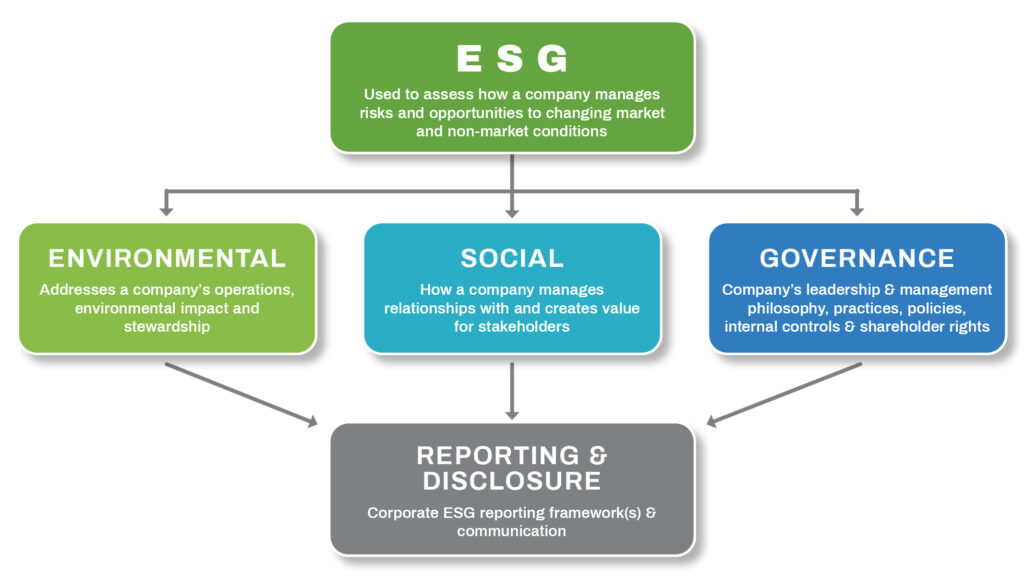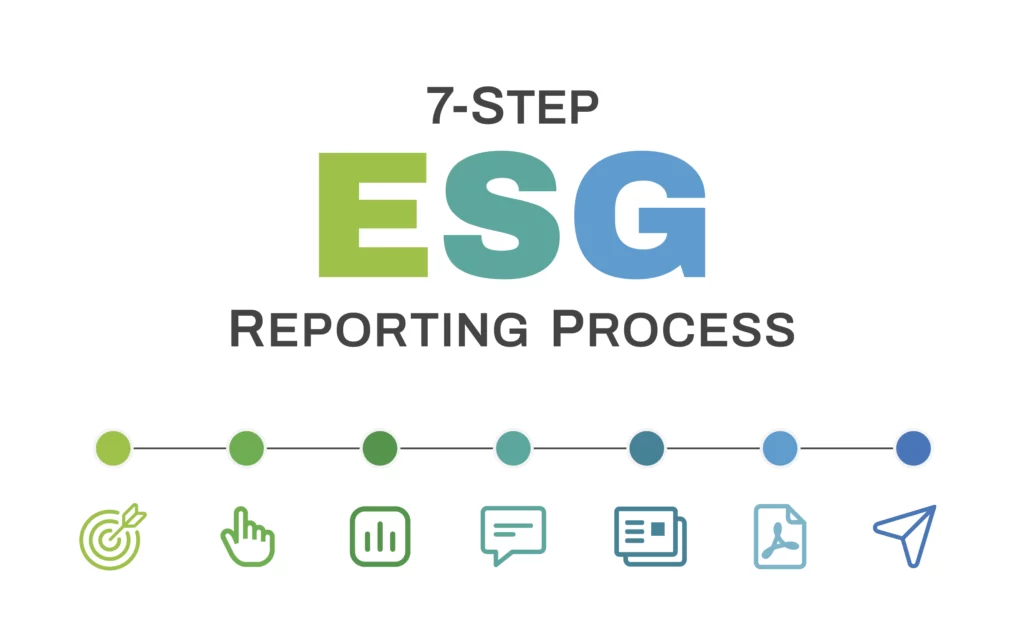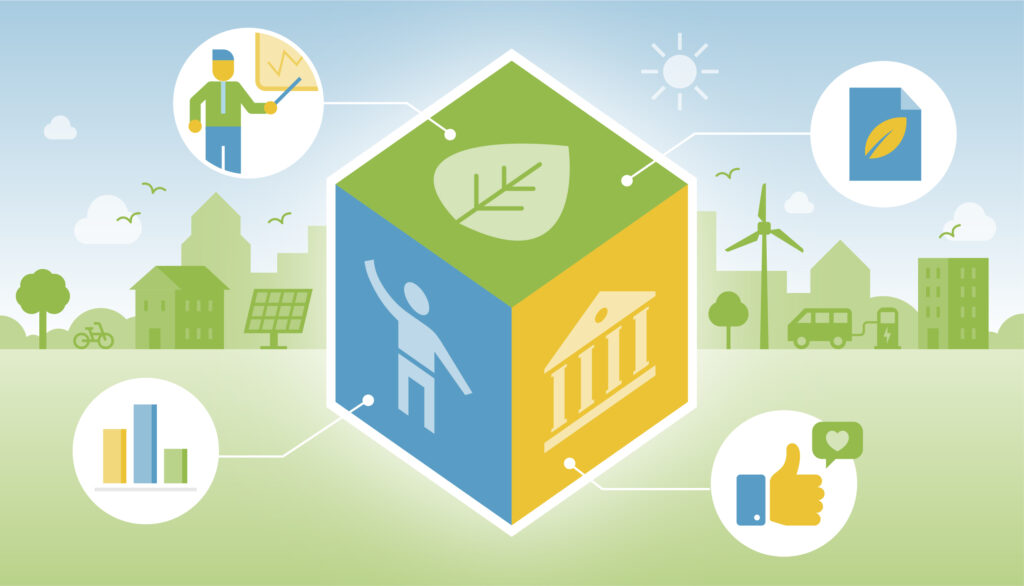Top 6 Reasons Why Companies Create an ESG Report
Sustainability & ESG / October 31, 2022
By Paul Gassett

At our agency, we frequently encounter questions like “What’s the value of an ESG report?” and “Why should companies create an ESG report?” Our vast experience includes designing over 60 ESG and sustainability reports, and we have gained some valuable insights from our experience. The following article delves into the top six reasons companies decide to produce an ESG report.
What is an ESG report?
Before we dive into the reasons why companies create ESG reports, let’s first define what an ESG report is. An ESG report is a document that outlines a company’s performance in the areas of environmental, social, and governance.
It provides information on the company’s impact on the environment, its relationships with its employees, customers, and communities, and its corporate governance practices. ESG reports are becoming increasingly important for companies as they strive to be more transparent and accountable to their stakeholders.
The value of ESG reporting
ESG reports outline how firms manage corporate reputation, reduce risk, identify opportunities, and enhance company culture. All of these add value to a company but they are creating ESG reports to meet increasing investor and market expectations.
Market expectations are driving companies to share how they are investing sustainably. Key drivers are governmental incentives and consumer behavior trends that value sustainability.
These market expectations have translated into a growing request from investors for ESG data. ESG issues have become much more important for long-term investors, according to a recent study by the Harvard Business Review.
Investors and asset owners, such as pension funds, have been considering sustainability criteria for decades. Recent trends show that more investors are taking meaningful action to integrate sustainability issues into their investing criteria.
To prepare for a shift in investment focus towards ESG, make sure to integrate it into your business. The next step is to ensure that you are communicating your ESG efforts in the most effective way possible.

Top 6 reasons why companies create an ESG report
Reason 1: Systematically share valuable information
ESG reports enable companies to engage their intended stakeholders and communicate their sustainability performance, impacts, and risks. Organizations can use reporting frameworks to share their sustainability initiatives with a large audience. Typically, they follow at least one or two of the ESG reporting frameworks.
Reason 2: Gain transparency & promote accountability
ESG reports can help raise awareness of sustainability issues, inspire action, and encourage better conversation. Companies need to provide a comprehensive report on the environmental impacts of their products and their sustainability practices.
ESG reporting can enhance a company’s license to operate. Therefore, it makes it easier to accomplish business objectives and respond to crisis scenarios.
Reason 3: Drive meaningful ESG progress internally and industry wide
Companies need to recognize and address the impacts of sustainability in their fundamental business models. This reflects a company’s commitment to creating a high-performing, purpose-driven workforce and an inclusive culture.
Reason 4: Improve efficiency and identify market opportunities
More investors are linking better environmental, social, and governance performance to financial performance. Sustainability reporting helps companies create value by identifying opportunities to minimize operating costs and maximize returns on capital.
Unmet needs, underserved customers, and potential strategic relationships can be exposed by shifts in the market and non-market conditions.
Reason 5: Identify and mitigate future risks
An ESG report has become an important tool for better risk management. The document allows companies to thoroughly assess their sustainable challenges from multiple angles.
By viewing problems from different perspectives, companies can provide insights and find new ways to improve their sustainability practices. Ultimately this leads to lower risks due to supply line interruptions.
In addition, ESG reporting helps identify immediate and long-term risks (i.e. material and labor availability as well as evolving regulations) depending on the industry and business model.
Reason 6: Provide a critical competitive advantage
It is clear that having an accurate ESG report is necessary for successful business performance. Customers are becoming more environmentally aware, and having an ESG report will help companies create a positive brand image. A well-crafted ESG report can improve ESG rankings, making it more likely for companies to attract additional investment.
A well-crafted ESG report can make a difference
A well-crafted ESG report can contribute significantly to a company’s ESG ranking success. Here are a few ways in which a well-crafted ESG report can make a difference:
- Transparency and Disclosure: A well-designed ESG report provides comprehensive and transparent information about a company’s environmental, social, and governance practices. It demonstrates the company’s commitment to sustainability and responsible business practices, which can positively impact its ESG ranking.
- Measurement and Metrics: An effective ESG report includes relevant and measurable metrics demonstrating the company’s progress in key areas. By providing clear data and performance indicators, the report helps investors and stakeholders assess and compare the company’s ESG performance with industry peers.
- Strategy and Goals: A well-designed ESG report outlines the company’s sustainability strategy, goals, and targets. It shows how the company aligns its business practices with ESG principles and works towards long-term sustainability. This strategic approach can enhance the company’s ESG ranking by demonstrating its commitment to continuous improvement.
- Stakeholder Engagement: An effective ESG report engages stakeholders and demonstrates how their input has influenced the company’s sustainability initiatives. By showcasing meaningful stakeholder engagement, the report highlights the company’s responsiveness to stakeholder concerns and can positively impact its ESG ranking.
Improving ESG ratings and rankings: Fortune Brands Home & Security
There are many aspects to a company achieving favorable ESG ratings and rankings. A variety of reasons are rooted in material bottom-line improvements as well as societal improvements. A well-crafted ESG report contributes to a company’s ESG ranking success.
One example of how a company continuously improves its ESG reporting is Fortune Brands Home & Security.
Fortune Brands Home & Security is a leading home and security products company that has made significant progress in its ESG reporting over the years.
Fortune Brands Home & Security has continuously improved its ESG reporting by:
- Expanded ESG reporting scope includes wider range of factors for comprehensive understanding of sustainability performance.
- Ambitious sustainability goals set, with regular tracking and reporting on progress.
- Improved data collection processes ensure accurate and reliable reporting of key metrics.
- Active stakeholder engagement to address expectations and concerns.
You can learn more about Fortune Brands’ continuous ESG reporting improvement.
How to prepare an ESG report
If you are interested in creating an inaugural report or seeking ways to improve your report’s effectiveness, seek advice from experts. These experts can help improve the outcome and ultimate success of your report.
They can help you:
- Lead your company through the various steps in the process
- Help your company position and convey your sustainability approach, accomplishments and aspirations with greater impact and transparency
- Improve your stakeholder engagement and reach to a broader global audience
Don’t know how to get started?
ESG reports are an important tool for measuring and communicating the environmental, social, and governance performance of companies.
To prepare an effective ESG report, it is critical to understand the process and to partner with the right people.
Learn how to prepare an effective ESG Report by reading The 7-Step ESG Reporting Process.
Designing your next ESG report?
ESG reports are important business communications tools. They help your company manage risk, identify potential problems, improve credibility, and address environmental impact. Ultimately, your ESG report should illustrate how your company creates value for all stakeholders.
The process of creating a successful ESG report hinges on the science and art of solid, professional experience. Crafted properly, they can be an effective tool in improving your ESG ratings and rankings.


